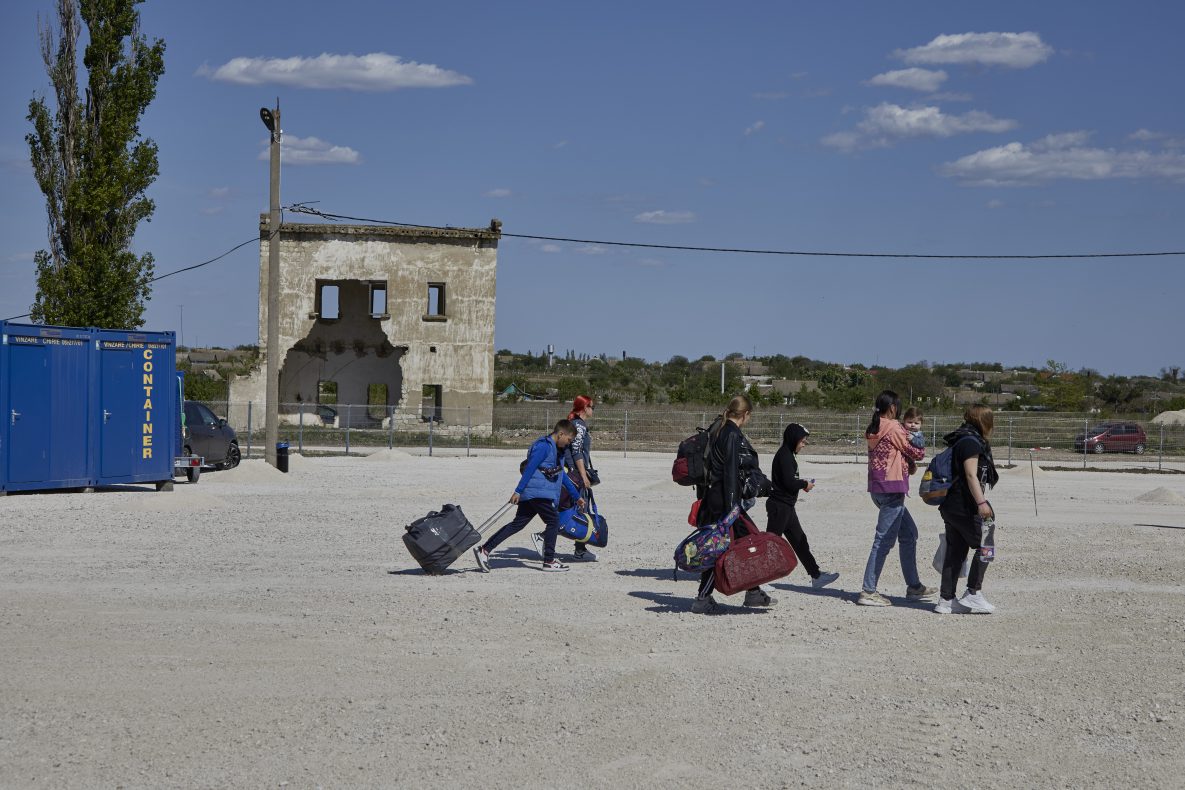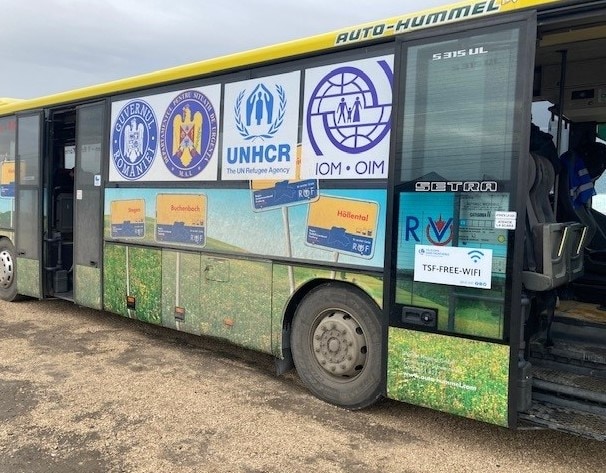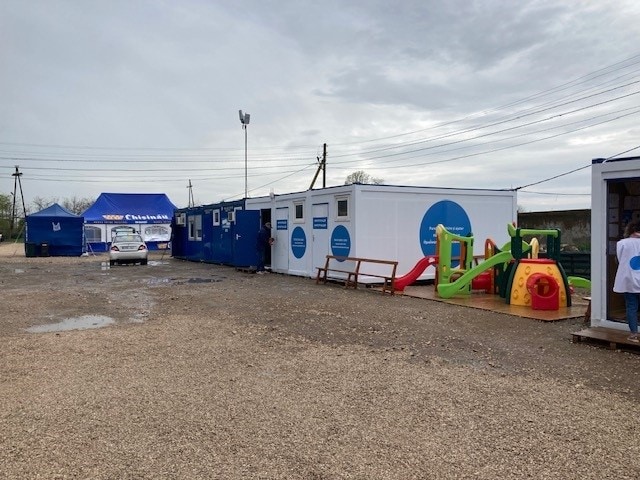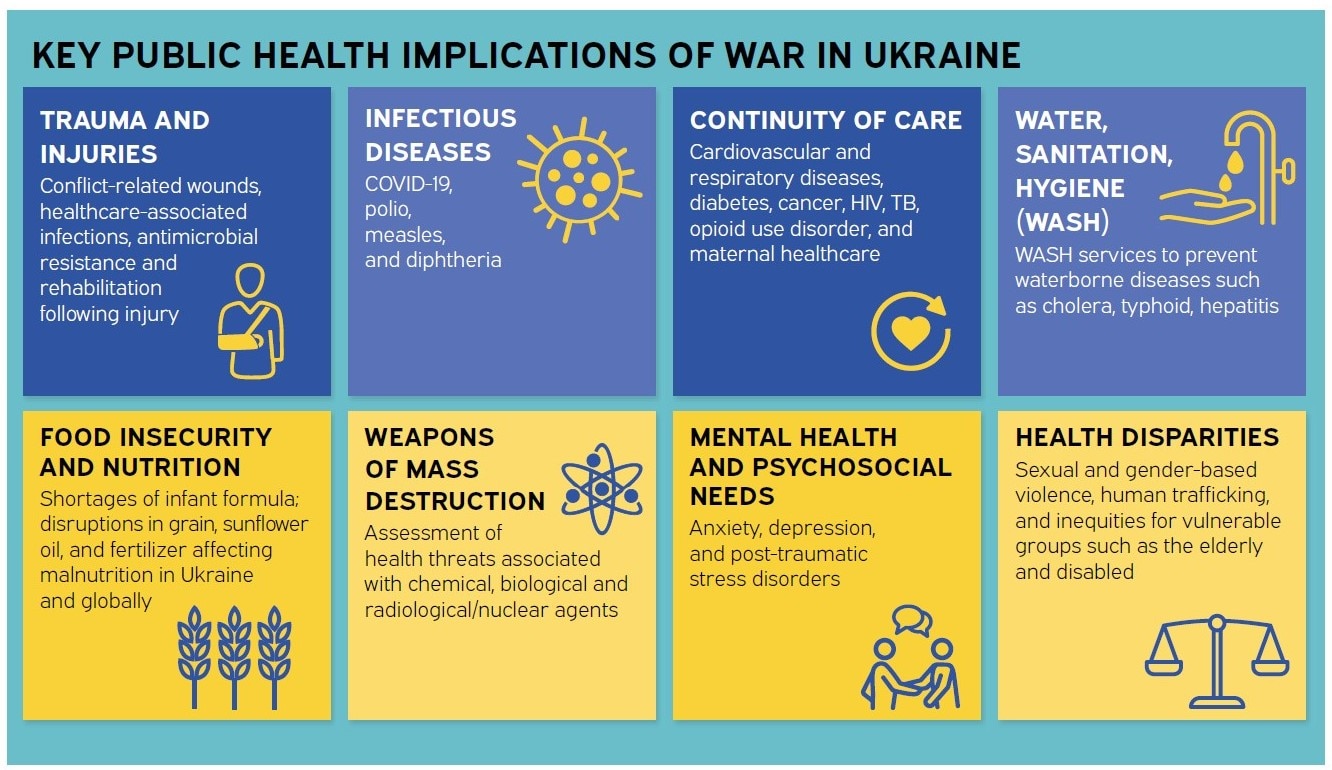CDC Experts and Global Partners Unite to Support Humanitarian Efforts in Ukraine
June 17, 2022

A group of Ukrainians carrying luggage as they cross to and from Ukraine at the Palanca border in Moldova. Photo Courtesy of UNHCR
“The current situation in Ukraine is first a human tragedy. The war has placed unimaginable stress on Ukrainian and neighboring healthcare systems. CDC Ukraine is proud to partner with the Government of Ukraine alongside other international and Ukrainian organizations to continue providing essential health services and technical assistance to those most in need. Millions of displaced Ukrainian citizens are anxiously awaiting news that they can return home, and when they do, CDC Ukraine will be there to ensure that the health system is prepared to cope with all of the challenges that come with a post-conflict environment.” – CAPT Ezra Barzilay, MD, CPH, CDC Ukraine Country Office Director
Every year on June 20, World Refugee Day is an opportunity to recognize the courage and resilience of millions of people who are forced to flee their homes because of violence or persecution, as well as the generosity and commitment of the communities and humanitarian partners who support them. This year, the observance is especially significant because the number of displaced people worldwide has surpassed 100 million for the first time on record. The world has reached this tragic milestone because of ongoing global conflicts and recent violent escalations, such as the war in Ukraine.
Since February 2022, the Government of the Russian Federation has carried out brutal attacks on Ukrainian cities, causing widespread destruction of infrastructure, loss of civilian lives, and the largest and fastest displacement of people from their homes since World War II. In a matter of weeks, an estimated 13.6 million people fled their homes to seek safety, either in Ukraine or neighboring countries. To respond to the complex health needs within Ukraine and border countries, CDC quickly mobilized to support the humanitarian response efforts of the U.S. government, Ukraine Ministry of Health, regional partners, United Nations, and non-government organizations.
Strengthening Humanitarian Response Efforts Through Partnerships
Air strikes on key Ukrainian infrastructure have caused large-scale loss of human life and limited people’s ability to buy food, drink clean water, use electricity, and remain in their homes. Over 200 direct attacks on Ukrainian health facilities, medical transportation, supplies, healthcare workers, and patients affect whether necessary healthcare services are available and safe to access. However, years of investments in strengthening core public health services and capabilities provided a foundation for the Ukrainian Ministry of Health’s quick and agile humanitarian response. Since 2010, the CDC Ukraine Country Office has supported the Ukrainian government and partners to advance global health security through workforce development such as the Field Epidemiology Training Program, laboratory network improvements, and strengthening of the Ministry of Health’s Center for Public Health.
As the Ukrainian Ministry of Health and multilateral partners confront today’s pressing public health priorities, CDC is leveraging leading technical experts across the agency to provide support through programmatic and scientific guidance. This includes activating an emergency response incident management structure, providing training on complex humanitarian emergencies and post-disaster needs assessments, and navigating supply chain disruptions. Leading technical experts are also weighing in on how to prioritize and adapt existing programs to tackle emerging health needs such as war-related injuries and associated antibiotic-resistant wound infections, acute diarrheal diseases, and disrupted care for chronic diseases. To address mental health issues that the war has heightened, CDC is supporting the proposal of strategies such as a digital platform of regional mental healthcare networks available in local languages. “Issues surrounding mental health are going to continue for a long time,” says Dr. Barbara Lopes-Cardozo, CDC technical expert in Mental Health and Psychosocial Support. “People have been severely traumatized from the war, so part of the recovery should plan for grappling with psychosocial support now, in the near future, and for generations to come.”
Collaborating to Prevent New and Emerging Health Threats

A bus transporting displaced Ukrainians from the Moldova-Ukraine border to Romania. Photo Courtesy of CDR Andy Boyd/CDC
During humanitarian emergencies, normal systems of public health surveillance that help prevent disease outbreaks tend to break down because of disruptions to routine health services and challenges to tracking potential cases. Measures that reduce the spread of infectious diseases such as getting vaccinated, being in uncrowded and well-ventilated spaces, and wearing masks may be limited as people are forced to flee.
CDC is helping regional partners address health threats by enhancing screening and surveillance for diseases of epidemic potential and developing novel tools to conduct rapid health assessments. CDR Andrew Boyd, MD, a CDC Medical Officer deployed with the Department of State’s Bureau of Population, Refugees, and Migration for a short-term field assignment in Moldova to assist with disease surveillance at border crossing sites. Through targeted support, CDC collaborated to conduct a technical review of funded public health activities that the regional partners identified as priorities.
In addition, Dr. Patrick O’Connor, a CDC measles technical expert, traveled to Warsaw, Poland with the World Health Organization to strengthen surveillance of vaccine-preventable diseases in humanitarian settings and to pilot rapid diagnostic tests for measles. These tests are designed to quickly detect disease, prompt public health action, and direct people to treatment. “Increases in measles cases are an early warning sign of overall healthcare challenges but particularly with immunization and disease monitoring programs,” says Dr. O’Connor. “The current rise in global measles cases is creating the perfect storm as programs work to recover from COVID-19 disruptions and respond to the humanitarian conflict. Efforts to prepare healthcare systems to prevent outbreaks become even more urgent not only for the Ukraine crisis but programs globally,” he added.
Preparing for Recovery and Rebuilding

Service site at a Ukraine-Moldova border crossing site, Palanca, Moldova. Photo Courtesy of CDR Andy Boyd/CDC
The violence and resulting displacement in Ukraine threaten existing gains in managing disease and expose both local and global populations to new health threats. At the same time, innovation among CDC and partners is helping to reduce healthcare challenges, strengthen global health security, and guide evidenced-based strategies for future responses.
Although the current humanitarian response is ongoing and evolving, planning is underway to determine how to resettle those who are displaced and rebuild key public health systems, such as facilities, programs, and personnel. These efforts are centered around not only restoring critical health infrastructure and medical facilities, but also making improvements that address identified gaps and provide long-term safeguards. Locally employed CDC staff serve as vital connections that enable the agency to understand the priorities on the ground, what is working well, and how to strengthen capacity for future emergency responses. “The COVID-19 pandemic taught us that health crises don’t happen in isolation – they have ripple effects across the globe. By engaging in response and recovery efforts alongside longstanding partners, CDC can help reduce illness and death in Ukraine while bolstering global health security moving forward,” says Dr. Leisel Talley, CDC Incident Manager for the Ukraine response.
